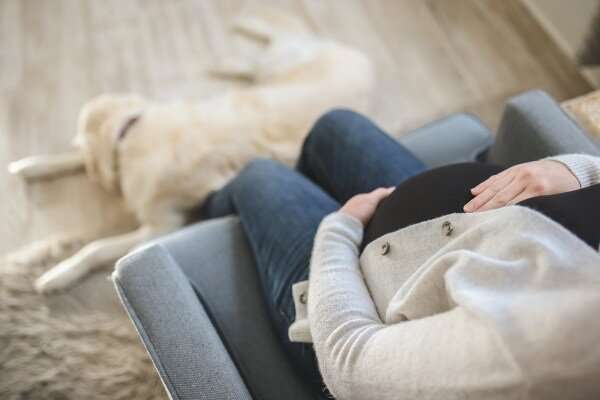The psychological effects of COVID-19 on pregnancy and postpartum

Women who gave birth during the COVID-19 pandemic report having felt greater stress in the delivery process, and rate lower the quality of care received.
Furthermore, almost 15% more women developed symptoms of postpartum depression after giving birth during the pandemic
A study carried out by researchers from the University of Granada (UGR) indicates that psychological variables have contributed to more severe anxiety and depression among pregnant women since the COVID-19 pandemic began. These psychological variables include the general stress suffered, the concerns that women have about the pregnancy itself, personal resilience, insomnia, fear of catching the virus, or the feeling of loneliness.
This study, published in the journal Medicina Clínica, has revealed that feeling stress, being highly concerned about the evolution of the pregnancy, fear of contagion, feeling lonely, and sleeping badly are the variables that most affect anxiety and depression.
"We have all experienced highly stressful, sad, or anxious situations at some point during the pandemic. Since the state of alarm was decreed in our country, thousands of people have had to deal with a new way of life that is completely unfamiliar. This situation has affected pregnant women in particular, who have experienced a growing sense of fear about the possibility of infection due to potential transmission to the fetus," explains the main author of this work, Borja Romero González, a researcher at the Department of Personality, Evaluation and Psychological Treatment of the UGR.
In addition, the uncertainty caused by the lockdown situation (especially in the spring of 2020), coupled with the experiences of these women in hospitals that are overwhelmed due to the pandemic, may have contributed to their stress and anxiety.
A study among 131 women
"During lockdown, we were all forced to change our day-to-day habits. So everything that surrounded us during that difficult time could help alleviate the negative effects of a situation in which we exchanged outdoor walks for looking out of a window, and visits to family members for video calls," the researcher at the UGR observes.
Against this backdrop, this study focused on determining which variables—be they psychological or specific to the lockdown experience—contributed to increasing or decreasing the levels of anxiety and depression in a sample of 131 pregnant women.
In addition to the aforementioned psychological variables, then, the authors also analyzed certain variables of the lockdown experience itself: the type of dwelling in which the women spent these months, whether they followed a balanced diet, and the frequency of video calls to family and friends.
The main findings were that psychological variables did indeed contribute to worsening anxiety and depression in pregnant women, which points to a clear conclusion: regardless of the major importance of where you live, how much contact you have with your relatives, and the type of diet you follow, the psychological state contributes more directly problems with anxiety and depression," explains Borja Romero.
The UGR researchers therefore consider it very important to target psychological interventions at the pregnant female population, "to listen to them and allow them to talk about their emotions, to minimize the impact of lockdown on more serious problems such as anxiety and depression. This could also have a positive impact on the fetus, since the close relationship between the mother's stress levels and the baby's neurodevelopment is well known.
Less satisfied
A second study compared the levels of satisfaction with childbirth and the incidence of postpartum depression in women who gave birth before vs. during the pandemic. The main results showed that those women who gave birth during the pandemic reported having felt greater stress during the delivery process, and they rated lower the quality of care they received in hospital. Likewise, almost 15% more women developed symptoms of postpartum depression after giving birth during the pandemic. This second study was based on a sample of 162 women and was recently published in the International Journal of Gynecology and Obstetrics.
One possible explanation for these phenomena may be that, during the state of alarm and the most critical moments of the pandemic, the Spanish hospital system suffered an almost total collapse. This likely affected the women's perception of the quality of care they received. In addition, having to give birth alone or being in an "inhospitable" place (as indeed all hospitals became during the pandemic) would increase the stress at the time of delivery.
"It is very important to note that satisfaction with childbirth is an indicator of later well-being, which is important in reducing the risk of suffering postpartum depression," concludes Borja Romero.
More information: Peralta-Ramirez, M. I. et al, Confinement variables by COVID-19 predictors of anxious and depressive symptoms in pregnant women, Medicina Clinica, S0025-7753
Peralta‐Ramirez, M. I. et al, Giving birth during the COVID‐19 pandemic: The impact on birth satisfaction and postpartum depression, International Journal of Gynecology & Obstetrics.



















